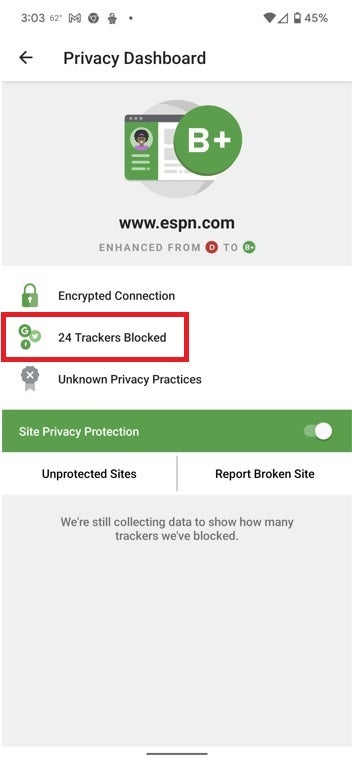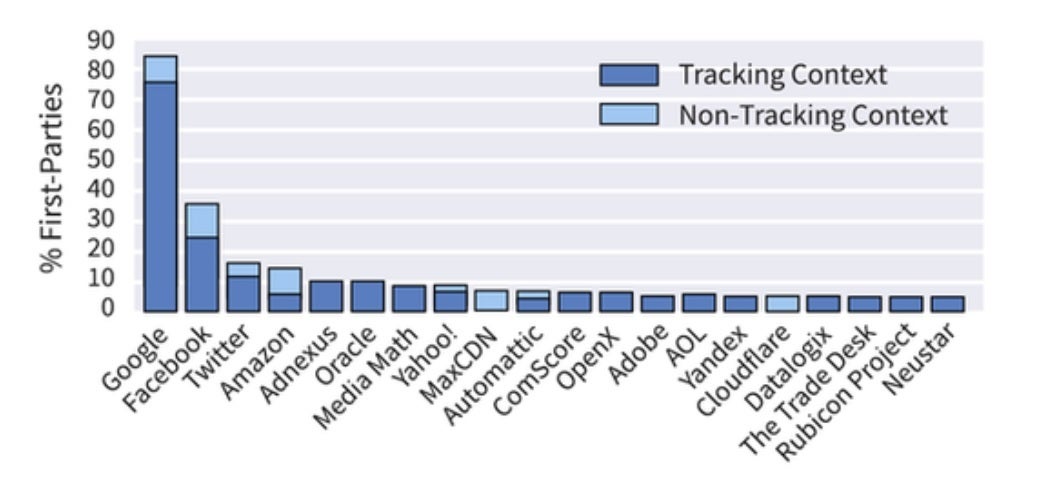DuckDuckGo Mobile Browser blocks you from being tracked

Since it was first released on February 29th, 2008, DuckDuckGo has became known as a privacy-first search engine, a browser that blocks trackers from following you, and an app that protects you from trackers even when you're simply accessing your email.
How does DuckDuckGo make money?
Now you're probably wondering how DuckDuckGo makes money, and that is a fair question. The company explains that since it doesn't collect your personal data, the search results you see on DuckDuckGo are based on the websites you are viewing rather than allowing trackers to use your browsing history to figure out who you are as a person. For example, if you are searching for cars, you'll see search recommendations on DuckDuckGo about cars.

DuckDuckGo blocked 24 trackers working with the ESPN website
And since search results aren't based on the data profile that others (like Google) create about you, the search results you see and the accompanying ads are all based on keywords you've typed in. As an example, if you open the DuckDuckGo app and search for dishwashers, you'll see results for dishwashers that are for sale. On the other hand, if you search on Google, your searches become part of a data profile that allows advertisers to follow you around the internet.
When search advertisers buy ads, they do so by bidding on keywords, not by bidding on people. As DuckDuckGo says, "Our privacy policy, in a nutshell, is to not collect or share any personal information at all. Every time you search on DuckDuckGo it is as if you were there for the first time – anonymous."

Google trackers follow you on 76% of the internet's websites
When you search for something on Google, you soon see ads for the product all over the place when you're online. According to the Princeton Web Transparency & Accountability Project, Google has trackers following you on 76% of websites on the internet. The same source says that Facebook has hidden trackers on 25% of websites online.
As a result, Google and Amazon have created huge data profiles that track your "interests, past purchases, search, browsing and location history, and much more. This personal data is stored indefinitely and used for invasive targeted advertising that can follow you around the Internet. And this information can be used for "hyper-targeting" which allows bad actors to use this data to influence elections, create discriminatory scenarios, and more.
DuckDuckGo quotes former Google CEO and Chairman Eric Schmidt as saying that "Google’s policy on a lot of these things is to get right up to the creepy line, but not cross it." But as the search engine points out, "for most people, that line was crossed by Google, Facebook, and others long ago."
If you want to give DuckDuckGo a shot, you can install it on your iPhone from the App Store, or for your Android phone from the Google Play Store.
Some people don't mind being tracked on their travels around the internet
Now we must point out that not everyone has a disdain for being tracked across the internet. It does help some people more easily compare pricing on a product they are interested in buying.
When you open a website using DuckDuckGo, you can see how many trackers are blocked by the app in real time. For example, 24 trackers were disabled on the ESPN site when we used the DuckDuckGo browser to visit the site just seconds ago. On the DuckDuckGo app, you can go into settings to block email trackers and hide your email address without switching your email provider. You can also sign up for App Tracking Protection and block trackers hiding in your other apps.
Inside the settings menu on the app, there is a setting for you to change the color of the iconic DuckDuckGo icon. The bow-tie wearing drake can be changed to appear in orange, red, green, blue, purple, and black.










Things that are NOT allowed: